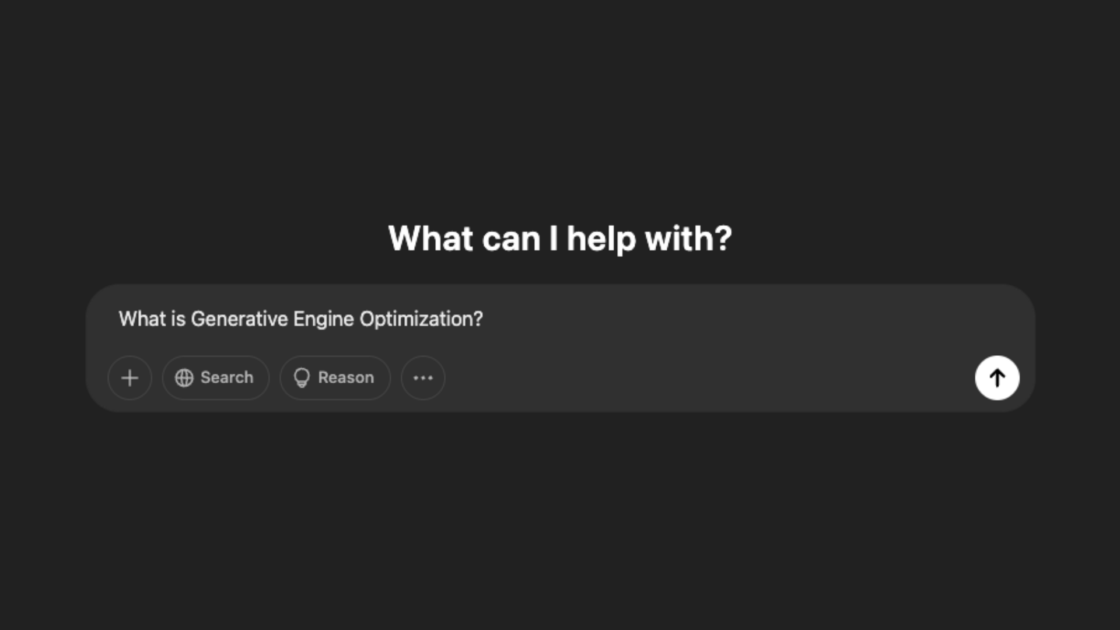What is Generative Engine Optimization (GEO)?


The world of search is changing, and it's changing fast. We're seeing artificial intelligence (AI) fundamentally change how we search and find stuff online. Traditional search engine results pages (SERPs) are giving way to dynamic, AI-powered interfaces that provide direct answers and insights. This shift, driven by advancements from companies like OpenAI, Google, and Microsoft, is significantly altering online information retrieval and usage.
Generative AI excels at understanding context, enabling it to deliver detailed, conversational responses that move beyond simple keyword matching. These AI search experiences also learn from user behaviour and preferences, offering highly relevant results. Instead of merely presenting links, AI can now directly answer questions, provide insights, and offer recommendations, thus enhancing the search experience.

These changes necessitate a fresh approach for businesses seeking online visibility. Generative Engine Optimization (GEO) has emerged as the new digital marketing, focusing on optimising content for AI-driven search engines. GEO ensures content aligns with the requirements of generative AI, emphasising relevance, user engagement, and contextual understanding.
In essence, GEO is the practice of optimising content to be recognised and utilised by AI-driven generative search engines, including platforms like ChatGPT, Perplexity, Gemini, Copilot, and Google AI Overviews. It's about ensuring your digital content achieves maximum reach and prominence when users employ these AI engines.
This AI revolution demands that businesses adapt to remain visible to their audience. While traditional SEO remains valuable, GEO is essential for navigating the nuances of AI-powered search. GEO represents an evolution of SEO practices, tailored for the new generation of search technology
It's important to understand that GEO isn't just SEO 2.0. While both aim to improve online visibility, they have key differences in how they achieve that goal.
Here's a handy table to visualise the key differences:
| Feature | Traditional SEO | Generative Engine Optimization (GEO) |
| Primary Focus | Ranking in search engine results pages (SERPs) | Being featured and cited in AI-generated responses |
| Target Audience | Human users navigating search results | AI-powered search engines and large language models (LLMs) |
| Content Goal | Drive traffic to a website | Ensure accurate brand representation in AI answers |
| Key Techniques | Keyword research, backlinks, technical SEO | Natural language optimization, structured data, topical authority, E-E-A-T, citations |
| Success Metrics | Keyword rankings, organic traffic, CTR, bounce rate | Brand mentions/citations in AI responses, featured snippets, knowledge panels, AI search performance scores |
It's super important for businesses to get their head around these differences so they can make smart decisions about where to put their marketing efforts. The bottom line? You can't solely rely on old-school SEO alone anymore. While SEO is still useful, and our strategies align heavily with GEO requirements, GEO is becoming increasingly crucial for online visibility.
The good news is that SEO and GEO aren't enemies! A lot of the good stuff you do for SEO (creating great content, having a technically sound website) also helps with GEO. The smartest move is to blend SEO and GEO strategies for the best results.
Embracing Generative Engine Optimization (GEO) offers a ton of compelling advantages for businesses:
Basically, GEO is about making your brand the go-to source for information, both for AI and for your customers. This builds trust, gets you noticed, and drives business.
This is a great question, and the honest answer is that it depends on your specific situation, goals, and the competitiveness of your industry. Think of GEO as an investment, not a quick fix. Like any good marketing strategy, it requires both time and resources to do it right.
Here's a breakdown of what influences the investment:
Absolutely! While GEO is a long-term strategy, there are definitely things you can do to get started and see some initial results.
Here are a few quick wins:
The key is to start with the fundamentals and gradually expand your GEO efforts.
Measuring the return on investment (ROI) of GEO is an evolving area, but here are some key metrics to track:
It's important to remember that GEO's impact might not always be immediate or directly attributable to sales. It's also about building long-term brand authority and trust in the age of AI.
Just like with SEO, there are definitely some things to avoid in GEO:
The world of AI is constantly evolving, and so is GEO. Here are some trends to keep an eye on:
The short answer is YES. Generative Engine Optimization (GEO) isn't just a buzzword; it's a fundamental shift in how we approach online visibility. Businesses that embrace GEO will be well-positioned to thrive in the age of AI-powered search. Those that stick to old-school SEO risk getting left behind.
It might seem daunting, but remember, you don't have to overhaul everything overnight. Start with the basics, stay informed, and adapt as the AI landscape evolves. The future of search is here, and let us boost your visibility.
As a consultancy, our full-funnel marketing and communications solutions are designed to fearlessly deliver business results across multiple industries and service areas.

Looking for a partner to help you reach your goals? We’d love to hear from you.